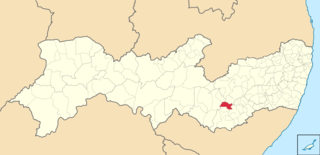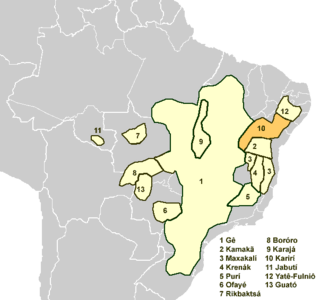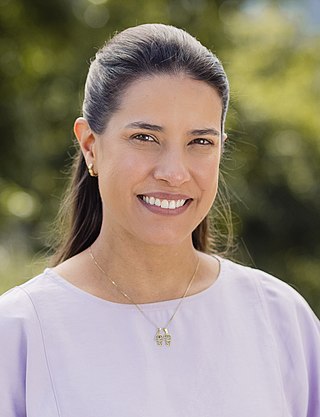| ||||||||||||||||||||
| ||||||||||||||||||||
| ||||||||||||||||||||
The Pernambuco gubernatorial election was held on October 3, 2010 to elect the next governor of Pernambuco. The PSB's Eduardo Campos won reelection in a landslide. [1]
| ||||||||||||||||||||
| ||||||||||||||||||||
| ||||||||||||||||||||
The Pernambuco gubernatorial election was held on October 3, 2010 to elect the next governor of Pernambuco. The PSB's Eduardo Campos won reelection in a landslide. [1]

Recife is the state capital of Pernambuco, Brazil, on the northeastern Atlantic coast of South America. It is the largest urban area within both the North and the Northeast Region of Brazil. It is the largest city in Pernambuco state, and the fourth-largest urban area in all of Brazil; the metro population of the city of Recife was 3,726,974 in 2022. Recife was founded in 1537, serving as the main harbor of the Captaincy of Pernambuco—known for its large-scale production of sugar cane. At one point, it was known as Mauritsstad, when it served as the capital city of the 17th century colony of New Holland of Dutch Brazil. Situated at the confluence of the Beberibe and Capibaribe rivers, before they drain into the South Atlantic Ocean, Recife is a major seaport along the Brazilian Atlantic coast. Its name is an allusion to the stone reefs that are present offshore. Together with the urban presence of the Beberibe and Capibaribe rivers and their tributaries, the many additional unique, small islands—and more than 50 bridges linking them throughout the city—create a distinct maritime or "riviera" atmosphere, leading to Recife being known as the "Venice of Brazil".

Pernambuco is a state of Brazil located in the Northeast region of the country. With an estimated population of 9.5 million people as of 2024, it is the seventh-most populous state of Brazil and with around 98,067.877 km2, it is the 19th-largest in area among federative units of the country. It is also the sixth-most densely populated with around 92.37 people per km2. Its capital and largest city, Recife, is one of the most important economic and urban hubs in the country. Based on 2019 estimates, the Recife Metropolitan Region is seventh-most populous in the country, and the second-largest in northeastern Brazil. In 2015, the state had 4.4% of the national population and produced 2.8% of the national gross domestic product (GDP).

Caruaru is a Brazilian municipality in the state of Pernambuco. The most populous city in the interior of the state, Caruaru is located in the microzone of Agreste and because of its cultural importance, it is nicknamed Capital do Agreste, Princesinha do Agreste, and Capital of agreste.

Clube Náutico Capibaribe, or simply Náutico, is a Brazilian multi-sport club based in Recife, Pernambuco. The club is most notable for its association football team, that plays in the Série C, the third tier of the Brazilian football league system, as well as in the Campeonato Pernambucano, the top division in the Pernambucano state football league system.

Ariano Vilar Suassuna was a Brazilian playwright and author. He was the driving force behind the creation of the Movimento Armorial. He founded the Student Theater at Federal University of Pernambuco. Four of his plays have been filmed, and he was considered one of Brazil's greatest living playwrights of his time. He was also an important regional writer, doing various novels set in the Northeast of Brazil. He received an honorary doctorate at a ceremony performed at a circus. He was the author of, among other works, the Auto da Compadecida and A Pedra do Reino. He was a staunch defender of the culture of the Northeast, and his works dealt with the popular culture of the Northeast.

Pesqueira is a Brazilian municipality in the state of Pernambuco. It had an estimated population in 2020 according to the IBGE, of 67,735. Its area is 980.876 km2.

Abreu e Lima is a Brazilian municipality in the state of Pernambuco. It is located in the Metropolitan Region of Recife, also known as Greater Recife. Abreu e Lima covers 126.193 km2 (48.723 sq mi), and has a population of 100,346 with a population density of 780 inhabitants per square kilometer. 75% of the area of the municipality is rural, but only 8% of the population lives outside of the urban center.

Alceu Valença is a Brazilian singer, musician, and songwriter.

Salgueiro Atlético Clube is a Brazilian football club, founded in 1972 in Salgueiro, Pernambuco.

Afogados da Ingazeira is a Brazilian municipality in the state of Pernambuco. The estimated population in 2020 according to the IBGE was 37,404, and the total area is 377.70 square kilometres (145.83 sq mi). It has a population density of 97 inhabitants per square kilometer. In 2000, Afogados da Ingazeira had the second highest Human Development Index (HDI) in the Alto do Pajeú sertão region of Pernambuco state. Nonetheless, its score (0.683) was still below the state (0.718) and national (0.789) averages. The city is the seat of the Roman Catholic Diocese of Afogados da Ingazeira.

Caetés is a Brazilian municipality located within the state of Pernambuco, in northeastern Brazil. The city belongs to the mesoregion of Agreste Pernambucano and microregion of Garanhuns. The name originates from the indigenous Caetés people who lived in Pernambuco in the 16th century. Caetés is notable for being the birthplace of Brazilian president Luiz Inácio Lula da Silva on 27 October 1945 at the time it was considered part of Garanhuns.

The Karirí languages, generally considered dialects of a single language, were a group of languages formerly spoken by the Kiriri people of Brazil. It was spoken until the middle of the 20th century; the 4,000 ethnic Kiriri are now monolingual Portuguese speakers, though a few know common phrases and names of medicinal plants.
Itapetim is the northernmost city in the Brazilian state of Pernambuco. The population in 2022, according with IBGE was 13,788 inhabitants and the total area is 411.9 km2.

Arena Pernambuco, officially named Estádio Governador Carlos Wilson Campos, is a multi-use stadium with a capacity of 45,440 spectators located in the western suburbs of the Recife metropolitan area, in São Lourenço da Mata, Brazil. It is mostly used for football matches and was notably used to host some matches during the 2014 FIFA World Cup.

Ouricuri is a city in the state of Pernambuco, Brazil. It is located in the mesoregion of Sertão Pernambucano. Ouricuri has a total area of 2,423 square kilometers and had an estimated population of 66,978 inhabitants in 2009 according to the IBGE.

Triunfo is a municipality in the Northeastern Brazilian state of Pernambuco. The estimated population in 2020, according to the Brazilian Institute of Geography and Statistics (IBGE) was 15,243. The area of the municipality is 191.52 km2, and in 2010 the population density was 78 inhabitants/km2. Triunfo sits at an elevation of 1,004 metres (3,294 ft) in a forested part of the Sertão, and is the highest municipality in Pernambuco.

Trindade is a municipality in the state of Pernambuco, Brazil. The estimated population in 2021, according to the Brazilian Institute of Geography and Statistics (IBGE) was 31,103 inhabitants and the total area is 295.77 km².

Antonio Nóbrega is a Brazilian singer, dancer and actor whose work features cultural traditions from Pernambuco.

The Pernambuco Federal Institute of Education, Science, and Technology (Portuguese: Instituto Federal de Educação, Ciência e Tecnologia de Pernambuco, IFPE) is a Brazilian institution of higher education located in Pernambuco State, Brazil. Its rectory is headquartered in Recife, Pernambuco. The IFPE is one of the oldest and most traditional among the Federal Institutes, it has 9 campuses and offers Technical, undergraduate and postgraduate courses, as well as researches and scientific production.

Raquel Teixeira Lyra Lucena is a Brazilian lawyer, politician and the current governor of Pernambuco since 2023. Lyra was mayor of Caruaru from 2017 to 2022. A member of a political family, she previously served as a member of the Legislative Assembly of Pernambuco. She is affiliated to the Brazilian Social Democracy Party (PSDB) but was a member of the Brazilian Socialist Party (PSB).